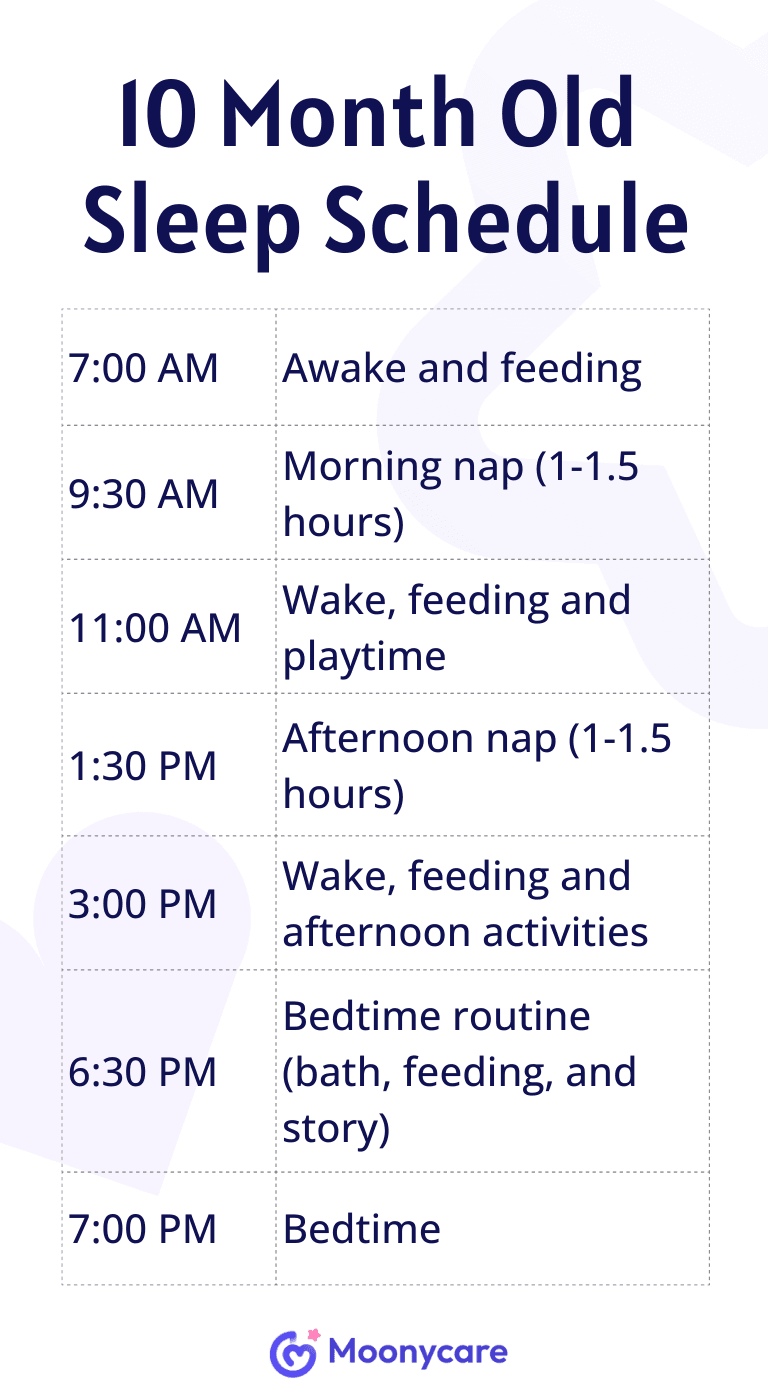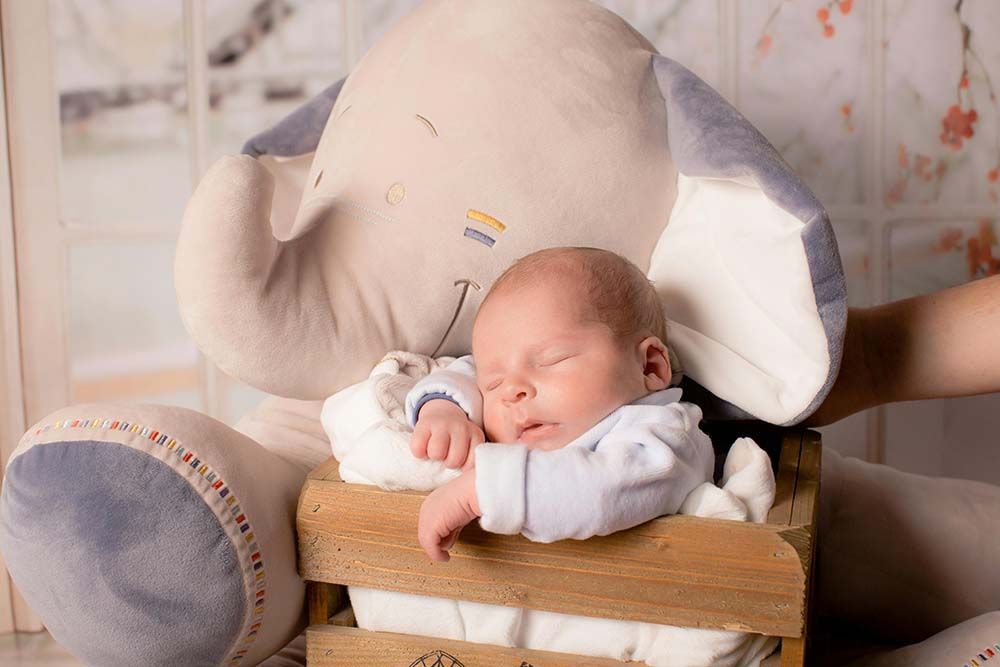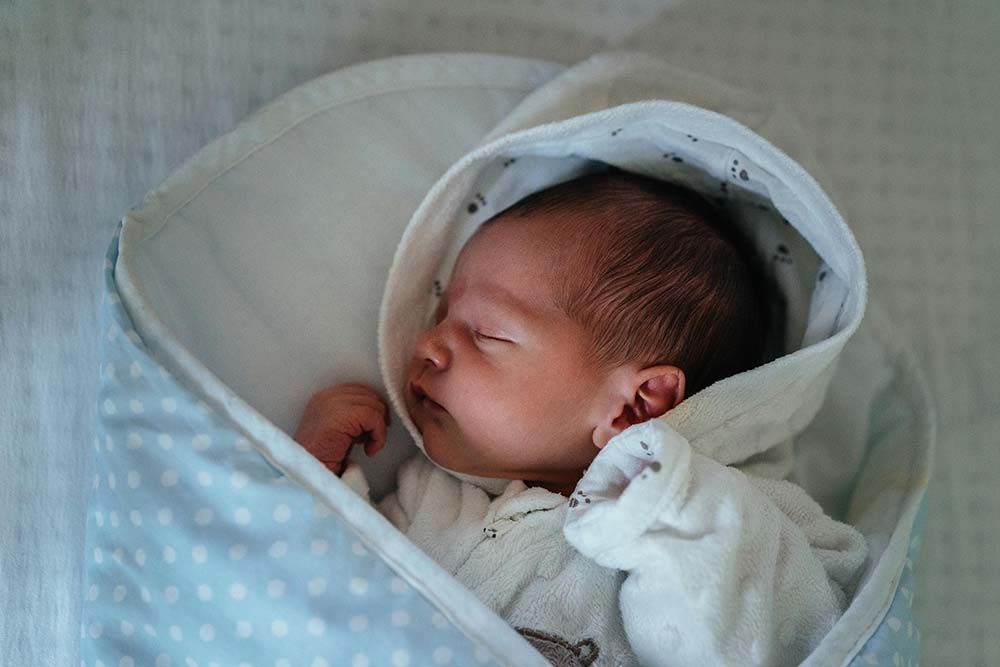

10 months is a significant milestone. At this age, babies grow more curiosity and energy to develop new skills. Accordingly, their sleep requirements get various changes. Thus, creating a 10 month old sleep schedule can be challenging. A practical routine is not only good for baby's development but also allows parents to manage more self-control time. If you have interests, welcome to read this article to get more details to go through this exciting developmental stage smoothly.
Establishing a consistent sleep schedule for your 10-month-old is crucial for their growth and well-being. However, every baby is unique, and what works for one may not work for another. If you need personalized guidance, it is recommended to use Moonycare, a specialized parental App to predict a customization sleep schedule according to your baby's sleep habits.
IN THIS ARTICLE:
What are Wake Windows for a 10 Month Old?
A Sample Sleep Schedule for 10 Month Old Babies
How Much Should a 10 Month Old Sleep?
How Long Should a 10 Month Old Nap?
How Many Naps are Suitable for a 10 Month Old?
What Time Should a 10-Month-Old Go to Bed?
Can a 10-Month-Old Baby Sleep Through the Night?
Can you Sleep Train a 10-Month-Old?
Is there Sleep Regression for 10 Month Old Babies?
What are Wake Windows for a 10-Month-Old?
Wake windows refer to the periods during the day when a baby is awake and active between sleep sessions. For a 10-month-old, wake windows typically range from 2.5 to 3.5 hours. The duration is longer than those for younger infants, reflecting their growing ability to stay awake and engage with their environment. Since it is largely depended on their current mood and daily activities, it is also important to watch for the baby's cues of tiredness.
Sample 10-Month-Old Sleep Schedule
A consistent daily routine can help your 10-month-old adjust to regular sleep patterns. Here's a sample schedule that you can tailor to fit your baby's unique needs:
How Much Should a 10-Month-Old Sleep?
At 10 months old, babies typically need 11-12 hours of nighttime sleep and 2-3 hours of daytime sleep. The total daily sleep requirement usually ranges from 13 to 15 hours. Ensuring your baby gets enough sleep is vital for their physical and cognitive development, as well as for their overall well-being.
How Long Should a 10-Month-Old Nap?
Each nap for a 10-month-old can vary in length, generally ranging from 1 to 2 hours. However, some babies may take shorter or longer naps, depending on their individual needs. It's crucial to observe your baby's sleep patterns and adjust the schedule as necessary. Some babies may benefit from a mixed longer and a shorter nap, while others may apt for equal-length naps.
How Many Naps Are Expected for a 10-Month-Old?
Most 10-month-olds take two naps per day. This schedule helps balance their need for daytime rest with the wake windows. Occasionally, a baby may try to drop a nap as they grow older, you can make an acceptable short nap for your baby to maintain the sleep circle. This two-nap schedule supports their developmental milestones and prevents overtiredness.
What Time Should a 10-Month-Old Go to Bed?
A good bedtime for a 10-month-old is typically between 7:00 and 8:00 pm. This time spectrum often allows babies to fall asleep more easily and reduces the possibility of night wakings. If your baby currently has a totally different bedtime but sleeps well, there's no need to make changes. However, if they are struggling with sleep issues such as difficulty falling asleep, frequent night wakings, or early morning wake-ups, adjusting bedtime to before 8:00 pm may be beneficial.
In addition, you can establish a consistent routine before bedtime to help your baby calm down and get ready for sleep. The routine can include calming activities such as a bath, reading a story, and playing soothing music.
Can a 10-Month-Old Baby Sleep Through the Night?
Yes. With self-dependant sleep skills and the enough intake of food or nutrients throughout the day, some 10-moth babies can sleep through the night without waking for a nighttime feeding or due to other needs. Also,consistent sleep training and a solid bedtime routine can increase the likelihood of longer stretches of uninterrupted sleep. And it is common for some babies to wake up once because of hunger.
But if your baby continues to wake frequently, the related reasons can be diverse, including teething, hunger, discomfort or some distracting developmental milestones. Additionally, separation anxiety might play a role, as babies at this age become more aware of their surroundings and their attachment to caregivers. Addressing these issues with appropriate soothing techniques and maintaining a consistent routine can help reduce nighttime awakenings.
Sleep Training a 10-Month-Old
Although some pediatricians advise new parents to start the sleep training between 4 and 6 months, actually it is never too late to start at 10 months. To be honest, the process will be a bit more challenging at this time because is becoming more dependant on you. But from the long term, sleep training can benefit both your baby and your future life.
There are various methods to consider, such as the Ferber method, cry-it-out, or gentle sleep training approaches. The key is to choose a method that aligns with your parenting style and your baby's personality. It may take a few days to a couple of weeks for your baby to adjust. Therefore, consistency,patience and calmness are crucial elements to get through this period.
Will a 10-Month-Old Have Sleep Regression?
Sleep regressions are common around 10 months and can disrupt established sleep patterns. This regression is often linked to significant developmental milestones, such as learning to crawl, stand, or even walk. Besides, separation anxiety usually occurs in this period, which can also inflate sleep regression.
At this stage, your baby might wake up more frequently at night or have difficulty settling down for naps. It's essential to remain consistent with bedtime routines and provide extra comfort as needed. Remember, this phase is temporary and usually resolves within a few weeks. Do not make any changes, otherwise, a temporary phase will be prolonged to a long struggle.
10-Month-Old Sleep Tips
Consistency is Key: Maintain a regular sleep schedule and bedtime routine to help your baby understand when it's time to sleep.
Create a Sleep-Friendly Environment: Ensure the nursery is conducive to sleep with a comfortable temperature, dim lighting, and a quiet atmosphere.
Watch for Sleep Cues: Look for signs of tiredness, such as rubbing eyes, yawning, or fussiness, and start the bedtime routine promptly.
Encourage Self-Soothing: Gradually teach your baby to fall asleep independently by allowing them some time to settle themselves.
Avoid Overstimulation: Limit stimulating activities close to bedtime, and use calming techniques to help your baby wind down.
Be Flexible: While consistency is essential, be open to adjusting the schedule based on your baby's needs and development.

























